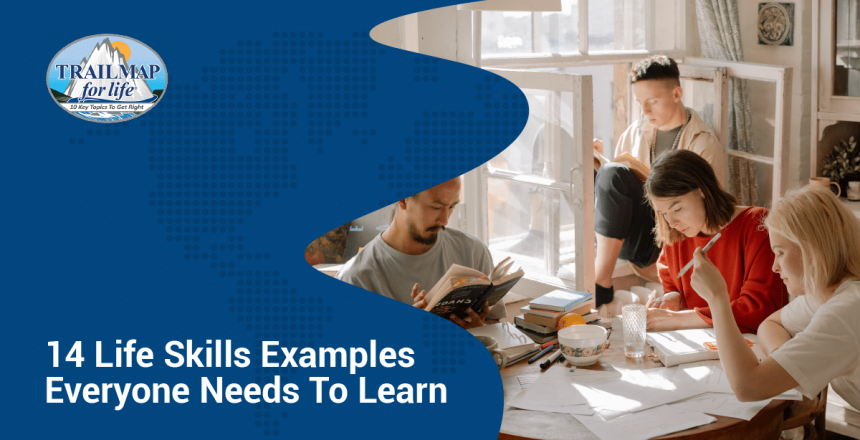Life skills are important tools we all use to manage our daily lives better.
These life skill examples include the ability to solve problems effectively, think carefully about different situations, communicate well with others, and make good choices.
They also involve being creative in finding new solutions, building strong relationships with people, understanding our feelings, feeling what others feel, and healthily handling stress.
Developing life skills is not only essential for personal growth but also for professional success.
They are not limited to one area of life and often overlap. For example, good communication skills are needed both at home and in the workplace.
Similarly, problem-solving skills are crucial in everyday life as well as in professional settings.
It’s essential to be intentional about learning the life skills that we need the most. Identifying which skills we lack and taking action to develop them can help us achieve our goals and improve our overall quality of life.
In this article, we will explore 14 essential life skills examples that can benefit you in multiple areas of your life.
Whether you’re a parent looking to instill these skills in your children or an adult seeking personal growth, these skills can help you enhance your communication, leadership, problem-solving, and more.
So, let’s dive in!

Communication
Effective communication skills are essential for success in all areas of life. These skills involve active listening, empathy, and clear expression.
When you communicate effectively, you can connect with others on a deeper level, build trust, and avoid misunderstandings.
This can lead to better relationships, increased career opportunities, and improved overall well-being.
To improve your communication skills, you can practice active listening by focusing on the speaker and asking questions to clarify your understanding.
You can also work on expressing yourself clearly and concisely while showing empathy towards others.
Your tone of voice, body language, and actions all communicate to your friends, family, co-workers, and strangers.
If you use these right, you will notice a huge change in your life.
Great leaders particularly have great communication skills.
Leadership
Being a successful leader requires possessing a set of skills that are crucial for personal and professional development.
These skills include the ability to encourage and motivate others, make informed choices, and manage disagreements constructively.
Possessing such skills enables you to inspire others and achieve shared objectives. This results in better team performance, increased job contentment, and enhanced self-esteem.
To develop your leadership skills, you can focus on enhancing your communication abilities, strengthen your emotional intelligence, and master the art of assigning responsibilities effectively.
Additionally, it’s beneficial to seek out leadership opportunities and hone your decision-making and conflict-resolution skills.
Great leaders know that their time is precious and can’t do everything themselves. Hence, they need to have superb time management skills.
Time Management
Time is a precious resource, and managing it effectively is key to achieving your goals and maintaining a healthy work-life balance.
Time management skills involve setting priorities, planning your schedule, and making the most of your time to achieve the desired outcomes.
It can help you reduce stress, increase productivity, and improve overall well-being.
To develop your time management skills, start by identifying your priorities and breaking down your goals into smaller, achievable tasks.
Use tools such as calendars, to-do lists, and scheduling apps to stay organized and on track.
Practice setting realistic deadlines and learn to say no to activities that don’t align with your priorities.
With consistent practice, you can master the art of time management and enjoy a more fulfilling and balanced life.
Sometimes the hardest part of time management is knowing how to properly solve complex issues.
Problem-Solving
Problem-solving skills are essential for navigating the challenges of daily life, both personally and professionally.
They involve the ability to identify problems, analyze information, and develop and implement effective solutions.
Developing strong problem-solving skills can help you become more resilient, adaptable, and resourceful, and can also enhance your creativity and innovation.
To improve your problem-solving skills, start by breaking down complex problems into smaller, more manageable components.
Use critical thinking and analytical skills to evaluate information and generate possible solutions.
Practice decision-making and learn from your mistakes to improve your problem-solving abilities over time.
Collaborate with others to gain new perspectives and insights, and embrace new challenges as opportunities to learn and grow.
With dedication and practice, you can become a skilled problem solver and will help you expand your overall interpersonal skills.
Interpersonal
Interpersonal skills are the ability to interact effectively with others.
These skills include communication, listening, empathy, and conflict resolution.
Strong interpersonal skills are crucial for building and maintaining healthy relationships.
Effective communication skills can help you express yourself clearly and understand others’ perspectives.
Active listening skills can help you engage in meaningful conversations and build trust with others.
Empathy allows you to understand and connect with others on a deeper level, while conflict resolution skills can help you navigate disagreements and find mutually beneficial solutions.
Developing your interpersonal skills can help you become a better communicator, leader, and team player, and can enhance your personal and professional relationships.
Practice active listening, express empathy, and be willing to compromise to strengthen your interpersonal skills.
You may have to use some creativity and push yourself in a new way to grow these skills.

Creativity and Innovation
Creativity and innovation skills involve the ability to generate new ideas, concepts, and solutions to problems.
These skills are not just limited to the arts and design fields; they are essential for all aspects of life, including business, science, technology, and normal day-to-day life.
Creative thinking can help you approach problems and challenges in a new and unique way, leading to innovative solutions.
Innovation skills involve the ability to turn creative ideas into practical and effective solutions.
Developing your creativity and innovation skills requires an open-minded approach and a willingness to take risks and try new things.
To enhance your creativity and innovation skills, you can practice brainstorming techniques, experiment with new approaches, and seek inspiration from a variety of sources.
By developing these skills, you can become a more innovative and creative problem solver and achieve greater success in your personal and professional endeavors.
Getting creative will help you in one of the main areas of life, finances.
Financial Literacy
Financial literacy skills involve the ability to manage your finances effectively.
These skills are essential for both adults and kids, as they help to establish financial stability and security.
Financial literacy skills include budgeting, saving, investing, and understanding credit and debt.
By developing financial literacy skills, you can learn to make informed money decisions and avoid financial difficulties.
You can improve your financial literacy by reading books and articles on personal finance, attending financial education classes or workshops, and seeking advice from financial experts.
With strong financial literacy skills, you can achieve financial independence and stability, and live a more secure and comfortable life.
Cultural Competence
Cultural competence skills involve the ability to understand and appreciate different cultures and to communicate effectively across cultural boundaries.
In today’s globalized world, cultural competence is becoming increasingly important for you and businesses alike.
Cultural competence skills include the ability to recognize and respect cultural differences, to adapt to different cultural norms and practices, and to effectively communicate with people from different cultural backgrounds.
By developing cultural competence skills, you can become more inclusive, empathetic, and effective in your personal and professional interactions.
You can improve your cultural competence by learning about different cultures, traveling to different countries, participating in cultural exchange programs, and seeking out diverse social and professional experiences.
As you learn about other cultures you will see yourself change as you can understand what it is like to walk in their shoes.
This creates a new level of emotional intelligence and acceptance in your community.
Emotional Intelligence
Emotional intelligence skills refer to the ability to identify, understand, and manage one’s own emotions, as well as the emotions of others.
They are critical for building positive relationships, managing stress and conflict, and achieving personal and professional goals.
Examples of emotional intelligence skills include self-awareness, self-regulation, empathy, and social skills.
By developing these, you can improve your communication, leadership, and teamwork abilities.
You can also increase your resilience and adaptability, and improve your overall well-being.
Be open to receiving feedback from those around you. You can openly ask how people see your emotional intelligence. Key tip, don’t fight back on what they say. This is to see how they perceive you on their side.
If numerous people say the same or similar things, acknowledge the trend and look inward at how you can improve.
As you recognize what you need to change, seek out how to do so and slowly implement them.
You will see the higher level of emotional intelligence you have, the better you will become at conflict resolution since you can manage your side better.
Conflict Resolution
One of the most important life skills that often gets overlooked is conflict resolution. Conflicts are inevitable but how you go about it matters.
It’s important to develop the ability to resolve conflicts effectively and efficiently.
Conflict resolution involves understanding the problem, communicating effectively, listening actively, and finding a solution that is acceptable to all parties involved.
It requires empathy, negotiation skills, and the ability to manage emotions.
For example, conflict resolution skills can come in handy when dealing with difficult family members, navigating disagreements with friends, or addressing workplace issues with colleagues.
By developing these skills, you can not only manage conflicts but also improve their relationships with others.
It may not always turn out how you want it to but you can use critical thinking skills to help find the best solution.
Critical Thinking
Critical thinking is a valuable life skill that involves analyzing and evaluating information to make informed decisions.
It helps you to identify and evaluate arguments, to detect inconsistencies and errors in reasoning, and to solve problems effectively.
In today’s fast-paced world, you with strong critical thinking skills are highly sought after in many professions.
These skills are essential for success in fields such as business, science, law, and education, among others.
To develop critical thinking skills, you can practice evaluating arguments, examining evidence, and considering multiple perspectives.
They can also learn to identify biases and assumptions and to recognize and avoid logical fallacies.
Examples of critical thinking skills include analyzing news articles, assessing the reliability of sources, evaluating scientific studies, and solving complex problems in the workplace.
By honing these skills, you can improve your decision-making abilities and become more effective problem solvers.
Digital Literacy
Having digital literacy skills is not just about being able to navigate technology at work, but also about having a healthy relationship with all things digital.
This includes knowing how to use social media responsibly and safely, being aware of the potential dangers of the internet, and finding a balance between time spent on screens and other activities.
It also includes having basic digital skills such as navigating the web, managing files, and using email.
By developing these skills, you can improve your overall well-being and maintain a healthy relationship with technology in all aspects of your life.
If you have an unhealthy balance of social media use or computer use, you may want to find ways to manage this so it doesn’t create unnecessary stress.
Stress Management
Stress is a common part of life, but it’s important to learn how to manage it effectively.
Stress management skills can help you stay calm and focused even in challenging situations.
One important skill is to identify your sources of stress and develop strategies to manage them.
This might involve practicing relaxation techniques, such as reading the bible or deep breathing exercises.
It’s also important to maintain a healthy lifestyle, including regular exercise and a balanced diet.
Additionally, effective time management and prioritization can help reduce stress.
With practice, these skills can help you handle stress more effectively and improve your overall well-being.
Learn All of These Life Skills Examples!
In conclusion, life skills are essential for success and personal growth in all areas of life.
From communication and leadership to financial literacy and stress management, there are numerous examples of life skills that can benefit you in various ways.
Whether you are a student, a professional, or a stay-at-home parent, learning and developing life skills can help you achieve your personal and professional goals, improve your well-being, and enhance your overall quality of life.
So, take the time to identify the life skills you need to work on and find resources to help you develop them.
This could include books, online courses, workshops, or simply practicing them in your daily life.
Remember, mastering life skills is a journey, not a destination.
It takes time, effort, and practice. But the rewards are worth it.
By investing in your personal growth and development, you can become a more effective communicator, a better leader, a more financially savvy person, and a more well-rounded individual.
So, don’t wait any longer. Start developing your life skills today and unlock your full potential.






